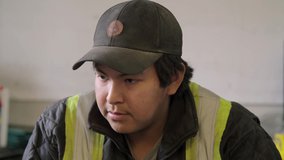New release
Coming
None
Wapos Bay - Tant que la rivière coulera
2007
23 min
Leaving soon
Quand il propose de présider le conseil des jeunes Autochtones, T-Bear se retrouve sous les projecteurs et doit alors apprendre à ne pas s’accorder le crédit pour une idée qui lui a été suggérée par Talon. Wapos Bay est une joyeuse série d’animation, qui relate les aventures de trois enfants d’une communauté crie du nord de la Saskatchewan.

Details
Quand il propose de présider le conseil des jeunes Autochtones, T-Bear se retrouve sous les projecteurs et doit alors apprendre à ne pas s’accorder le crédit pour une idée qui lui a été suggérée par Talon.
Wapos Bay est une joyeuse série d’animation, qui relate les aventures de trois enfants d’une communauté crie du nord de la Saskatchewan.
Wapos Bay est une joyeuse série d’animation, qui relate les aventures de trois enfants d’une communauté crie du nord de la Saskatchewan.
-
music - compositionRoss Nykiforuk
-
editorJennifer Prokop
-
director of photographyAlan Poon
-
producerDennis JacksonMelanie JacksonAnand RamayyaDerek Mazur
-
NoneDennis JacksonEllen McEachernTrevor CameronJason BohnCam LizotteAndrew DollDevon LoiselleShane MolloyTed HeeleyAllison TrackDiana GossnerDwayne TurtaElmer EstilloreAngela EdmondsTeri ArmitageTatyanna ElashJohn ButlerDelvin KanewiyakihoScott CollinsRolande PetitMyriam CôtéBenoit RousseauPatrick LoiseauGabriel RondeauMarc-André Charbonneau
-
directionDennis Jackson
-
series conceived byDennis JacksonMelanie Jackson
-
voiceGuy NadonFrançois-Nicolas DolanMartin WatierAline PinsonneaultPierre ChagnonChristine LandryClaudine ChatelÉlizabeth ChouvalidzéManuel TadrosHugolin ChevretteMarie-Andrée CorneilleBernard FortinJacques LavalléeDaniel PicardFrançois Godin
-
executive producerDerek Mazur
-
associate producerRick Stefanowski
-
production consultantTorin Stefanson
-
lead animatorDiana Gossner
-
animation consultantC.A. Pounds
-
animatorGilbert BaldheadStacy KulykCarll MachiskinicBentley PoochayJustin Scales
-
additional animatorLisa LorenzoKelly MorrisonCurtis Witt
-
artistic directorDiana Savage
-
character designCarll MachiskinicBentley Poochay
-
character sculptureCarll MachiskinicBentley Poochay
-
costume designerAmalie Atkins
-
set constructionClayton Malinski
-
armature designPaul Atkins
-
armature constructionPaul Atkins
-
mould makerStacia Verigin
-
assistant to the production managerBrandi Hattum
-
storyboard supervisorCam Lizotte
-
storyboard artistGilbert BaldheadAndrew Doll
-
chief electricianCraig Olson
-
stage handAaron Jackson
-
post production supervisorTorin Stefanson
-
visual effects leadAlina Pete
-
post-production assistantTeri Armitage
-
online editorDenis GathelierFrançoise Laprise
-
scannerSheena Lizotte
-
audio post supervisorRoss Nykiforuk
-
sound effects creationDaryl PierceRandy Woods
-
sound effectsDaryl PierceRandy Woods
-
re-recording mixerEvan Rust
-
musicianRoss NykiforukRandy WoodsAnna BekolayCarrissa KlopoushakJames Steele
-
production coordinatorLinda NemethCarolie Legault-Lanouette
-
production accountantLinda Nemeth
-
program administratorCyndi Forcand
-
post-production managerPatrick Loiseau
-
production supervisorDominique Lalonde
-
assistant coordinatorValérie Boileau
Education
Pedagogical evaluations and study guides are only available to CAMPUS subscribers.
CAMPUS
Features designed specifically for teachers. Learn more
Already subscribed? Sign in











